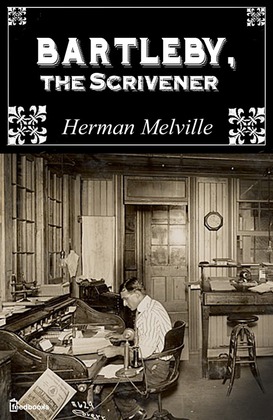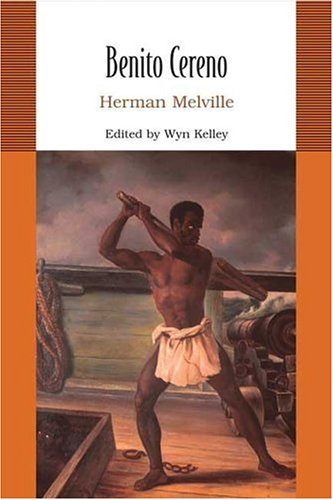Taking on Melville's Bartleby, The Scrivener and Benito Cereno for Week Three of my MOOC*, I'm beginning to see why. Judging by these two (long) short stories, he's not the most accessible of writers, especially when read electronically on Project Gutenberg.
Professor Weinstein insists these are two more examples of literature from an earlier period, which shine a light on our own understanding. I'm hoping his analysis will focus a torch beam on mine.
* If you haven't read these two stories, there are spoilers*
Bartleby, The Scrivener
This tale of mid-nineteenth century Wall Street is narrated by an elderly lawyer who already employs two scriveners to copy out legal documents by hand. Increased business leads him to take on Bartleby, who initially appears to be a diligent worker.
Having already done 'an extraordinary quantity of writing', when requested to help proofread a document Bartleby replies, much to the lawyer's astonishment, with the now-iconic words:
'I would prefer not to'Over the coming weeks, Bartleby repeats this phrase whenever he's asked anything; from divulging the details of his personal life to so many aspects of his job that, finally, he's not working at all. What's more, he's taken up residence in the office and will not easily be removed.
This story was a puzzle to me. I failed to understand Bartleby's passivity and found the other scriveners to be one dimensional caricatures. Only the narrator emerged from the page as an engaging personality, which didn't make up for a dismal and unsatisfactory ending.
Professor Weinstein's analysis brings some clarity. In the lawyer, we have a narrator who goes so far beyond unreliability that he doesn't have a clue about the story he's telling. This raises the theme of 'getting it wrong ' and how common an occurrence it is, as we strive to make sense of our lives.
Although I thought the lawyer showed patience and consideration in trying to help his errant employee, the Professor suggests he's representative of the Wall Street establishment and sympathies are traditionally with Bartleby (mine weren't).
Bartleby is 'the copyist who refuses to copy' and in rejecting his work he can also be seen to be rejecting capitalism, with echoes of civil disobedience calling to mind Thoreau and Emerson. Professor Weinstein even compares Bartleby to Lucifer refusing to uphold the order of things (non servium - I will not serve). His words are contagious and the other office workers, including the narrator, begin using them too.
Here ahead of his time, Melville is playing with the traditional narrative form; creating Bartleby as a character who is essentially a void, and an ending which leaves the reader to make sense of it all.
Benito Cereno
Melville wrote this tale of slave revolt in 1855, six years before the American Civil War. It's based on real events and Amaso Delano, captain of the ship which discovered the drifting San Dominick, really existed.
This is another story of a narrator who fails to understand what's in front of him, because what he sees is scripted by what he knows. He believes the slave ship to be in a forlorn state due to the Old World incompetence of its Spanish captain Benito Cereno, while he holds a 'noble savages' view of the slaves.
Did you see it coming? asks Professor Weinstein. I certainly understood what was happening long before Captain Delano and I'm sure others did too, arguably because we now read in a sophisticated manner, on the look-out for reversals of plot.
When you realise who's in charge of the ship, you begin to interpret this story in an entirely different way. The grisly demise of the slave owner Don Alexandro and the the central shaving scene both take on a particularly chilling air. At the time of Melville's writing, this would have overthrown what was seen as the the natural, God-given hierarchy of power in the most shocking of ways.
Learning about the context and analysing the themes of both these stories has helped my understanding, but the verbosity and language of Melville still makes him a difficult read. I'm afraid Moby Dick will be waiting a while longer on the shelf.
Next week, Kafka: The Metamorphosis and A Country Doctor.
*Massive Open Online Course


Hhmm my H read Moby Dick last year ....took him about 3 months ( he IS a slow reader BUT) and almost becam a matter of honour to finish it ! I must admit this has put me off ....and I noticed John Sutherland named it as one of the Top
ReplyDelete10 unreadable novels recently .
That's interesting, I'm going to look up the other nine! These two stories were such a slog that I'm not at all inclined to tackle MB. Professor W speaks very highly of it as the 'great American novel', but without his analysis I'm not sure I could cope...
Delete